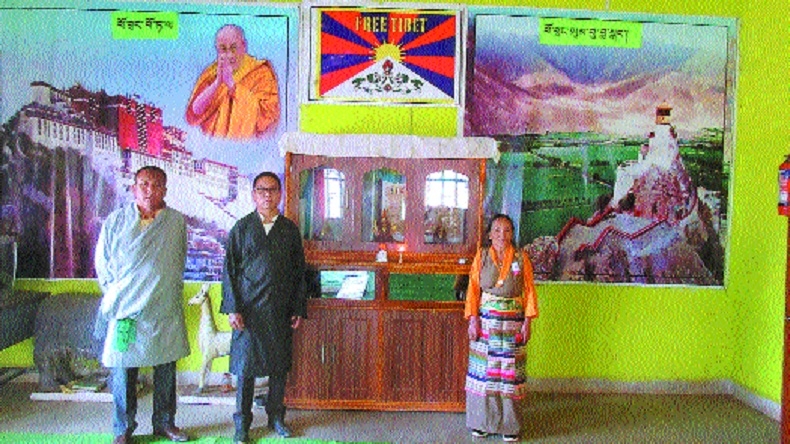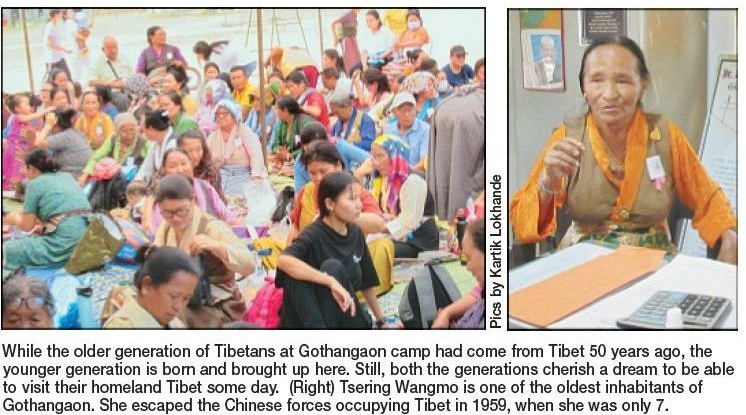Tibetans at Gothangaon dream to see Tibet free of Chinese occupation
Date :10-Mar-2022

(From left) Tenzin Pasang, Speaker of Local Tibetan Assembly; Karma Gelek, MP of Tibetan Parliament in Exile; and Tsering Wangmo keep alive the hopes of fellow Tibetans of returning to a Free Tibet some day. (Pic by Kartik Lokhande)
By Kartik Lokhande :
63rd anniversary of Tibetan National Uprising Day today
She was only a seven-year-old when the communist China’s final invasion of Tibet came in 1959. Now 70-year-old, sitting in the office of Sambhota Tibetan School at Gothangaon camp in Gondia district, Tsering Wangmo represents Tibetan refugees living in India and other countries when she says with moist eyes and lump in her throat, “Tibet should be freed of Chinese occupation. I feel that my end should come in free Tibet…” Though the communist China under Mao Tse Tung started a succession of territorial aggressions against Tibet since 1949, it dealt a final blow of invasion in 1959 to Tibet. On March 10, 1959, the Tibetan people revolted against the brutal occupation of their homeland by the communist Chinese forces. For Tibetans in exile, March 10 every year marks the anniversary of Tibetan National Uprising.
This year, they observe 63rd anniversary of Tibetan National Uprising. The 14th Dalai Lama, the spiritual head of Tibetans, and scores of his followers had to flee Tibet in 1959. Since then taking a refuge in India at Dharamshala and other places, the Dalai Lama has kept the flame of Tibet’s Independence alive and a Tibetan Parliament in Exile works in that direction. There are several Tibetan settlements/camps in India where the Tibetans in exile live, keeping alive their dream and preserving their culture and tradition. Gothangaon Tibetan Settlement is the only such camp in Maharashtra. The Tibetans at Gothangaon share the hope of Tsering Wangmo that some day their homeland Tibet, the spiritual kingdom, will be free from the communist China’s occupation.
When ‘The Hitavada’ visited Gothangaon and spoke to the people there about Tibetan National Uprising Day, they shared their tales and dreams. As far as Tsering Wangmo’s tale is concerned, she recounts that her father was among several Tibetan men who were ‘taken away’ by the Chinese. Like many other children, she left Tibet along with parents and elder relatives. The journey was arduous as the escaping Tibetans had to avoid getting spotted by the Chinese forces, survive inclement weather and rugged terrain without enough food and water, and carry the torch of hope lit by tears of pain while navigating through the darkness of fear and uncertainty. “We had to live like nomads. We travelled at night. My uncle passed away on the way, so also my beloved Yak. We all fled towards Nepal, and gradually we came to India,” she recalls. Since then, much has happened in the collective life on the planet. The Chinese grip over Tibet has tightened, but not enough to douse the flame of Tibet’s freedom. The communist China is bent upon appointing Tibet’s new spiritual head, of course, of its choice. China has been pushing the narrative of how Tibet has changed and become a part of China. However, Tsering Wangmo and other Tibetans in exile do not buy Chinese propaganda. “Tibet, at present, looks good but Chinese occupation is not good. Our temples have been demolished, converted to toilets and facilities for Chinese forces.
Our culture is under threat,” she says with pain in her voice. Karma Gelek, Member of Tibetan Parliament in Exile, tells ‘The Hitavada’ that his father too had died in Tibet. Like the Tibetans he leads, he strongly wishes to see Lhasa in Tibet before his death. “Chinese have created such conditions there at present that we cannot go visit our homeland Tibet,” he laments. As far as the Tibetan National Uprising Day on March 10 is concerned, he says that China under Mao sent forces masquerading as well-wishers of Tibet in 1949. But, gradually, communist China unmasked it and resorted to aggression and plunder and occupied Tibet, in the process forcing the Tibetans to escape and live in exile in India and other countries of the world. Like every year, he adds, statement of the Tibetan Parliament in Exile shall come on the Tibetan National Uprising Day. Karma Namga, Headmaster of Sambhota Tibetan School at Gothangaon camp, says that human rights of Tibetans are violated in Tibet occupied by communist China. “It happened then, and it is happening even now. Tibetans who escaped Tibet in 1959 with His Holiness Dalai Lama, are grateful that India has supported them well.
Through our school, we are trying to keep alive our culture. Till Std IV, we teach our younger generation Tibetan language. English is introduced since Std V,” he says. Dawa, another member of Gothangaon camp, was just four years old when his family fled Tibet. He has lived most of his life in India. In fact, he served in the Indian Army and was posted at Tuting during the India-Pakistan War of 1971. But, he shares the dream of every Tibetan. While the older and middle generations are still steeped in Tibetan cultural practices, the younger generations born and brought up in India speak Hindi very well and even sing songs. The youngsters like Dtenzin Noryang can even sing popular Marathi songs well. He and three other youngsters beautifully sang ‘Teri Mitti Mein Mar Jaawan’ song from a Hindi movie. Though their aspirations are befitting their generation, they have not forgotten the dream and hope of elders. One can find the reflection of that dream of ‘Free Tibet’ in the Prayer Room in Sambhota Tibetan School, on the wall of one of the buildings in the premises, in the celebrations of Losar (the Tibetan New Year), Parents Day (birthday of the Dalai Lama’s Mother), the Dalai Lama’s birthday etc. Interestingly, the Dalai Lama’s visits to Gothangaon camp, the last one in 2014, has been inspiring them to keep the dream alive. As the Tibetans in exile observe the 63rd anniversary of Tibetan National Uprising Day this year, they hope to find more support to their cause, from local level to the International level. They believe that hope is the brightest star and compassion is the biggest virtue.

Tibetan Parliament in Exile flays persecution by China in Tibet The Tibetan Parliament in Exile, headquartered in Dharamshala in Himachal Pradesh, issued a statement on Wednesday, on the eve of 63rd anniversary of Tibetan National Uprising. In the statement, it flayed the communist Chinese Government for persecution and oppression unleashed in Tibet. Also, it reiterated the call to China to enter into ‘a substantive dialogue’. The statement flayed the Government of China for being relentless in its continued pursuit ‘of a design to obliterate the very ethnic identity of the Tibetan people, along with their religion, culture, language and everything else’. “In this way, the government of China deprived the Tibetan people, the rightful owners of their national territory, of everything they ever owned, including the most basic of their human freedoms while subjecting them to such degrees of persecution and torture as if they stood condemned to live in hell on this land of the living itself. There is no mistake about the fact that the ultimate objective of the government of China is to turn Tibet into Chinese both in its outer form and internal substance.” it added. As per the Tibetan Parliament in Exile, a total of 156 Tibetans have carried out protests accompanied by self-immolation since 2009. It accused communist Chinese government of persisting on ‘misrepresenting the actual situation in Tibet with nothing but outright lies and distorted narratives’ and concealing the reality from Chinese people and International community by means of ‘employing all sorts of propaganda subterfuge’. In an effort to ‘Sinicize’ the Tibetans, it added, China was shutting down privately run Tibetan schools accompanied by Tibetan students being made to study policies of communist Chinese Government and speeches of its leaders. “Various types of campaign actions aimed at Sinicizing the Tibetan tradition of Buddhism are actively being carried out,” read the statement. It also alleged that China had carried out destructions in Drakgo County in Tibetan province of Kham including that of a 99-feet statue of the Buddha, prayer wheels containing a hundred million rounds of text of six-syllable Tibetan Buddhist mantra, demolition at Chanang Monastery etc. Besides, it accused China of arresting and beating Tibetan scholars, monks. Finally, the Tibetan Parliament in Exile reiterated its call to China to enter into ‘a substantive dialogue’ on the basis of ‘mutually beneficial Middle Way Policy’ in keeping with the desire of His Holiness the Dalai Lama. In the statement, it has also expressed solidarity with the people of Ukraine.